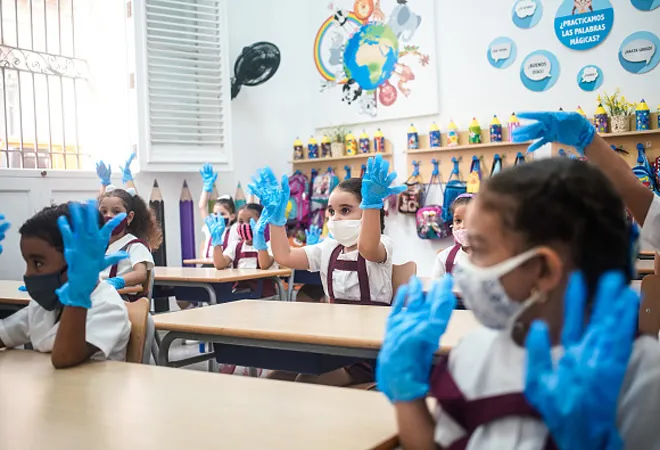-
CENTRES
Progammes & Centres
Location
The pandemic has exacerbated the income and digital divide in Brazil, particularly amongst the children and youth demographic

This article is part of the series Children and the Pandemic: An Analysis Across Countries
Although children and adolescents are comparatively less affected by the pandemic than adults or the elderly, the adoption of necessary measures of social isolation have nonetheless affected the children and youth population, especially impacting those who live in poorer households, in institutions of alternative care, those without parental care, and under other circumstances of vulnerability. Poor families, for example, have seen their incomes decrease day-by-day and as a result are forced to reduce expenses by cutting down on essential goods, such as food, medicines, and housing. The aggravation of such vulnerabilities during the pandemic in Brazil makes it essential to implement actions aimed at guaranteeing the rights of children and adolescents.
Amongst the most urgent issues are protection against poverty and hunger, the promotion of healthcare actions, the implementation of compensation measures for the interruption of school attendance, and the promotion of assistance and protection for high-risk groups.
Measures to combat the new coronavirus pandemic affect the lives of girls and boys, from the home environment of their families and communities to institutions and public spaces frequented by this population. Public policies aimed at children and young people need to be preserved and adapted to the current scenario and planned for the near future. Amongst the most urgent issues are protection against poverty and hunger, the promotion of healthcare actions, the implementation of compensation measures for the interruption of school attendance, and the promotion of assistance and protection for high-risk groups. This technical note is intended to draw attention to some of the main areas that can affect children and adolescents at present and in the post-pandemic period and that demand responses from families, society, and the State.
The impoverishment of families is certainly one of the cruellest impacts on the lives of children and adolescents. Restrictions on maintaining jobs and family income sources are some of the perverse effects of the necessary social isolation measures to contain the outbreak of the pandemic. The ‘extremely poor population’ living below the international poverty line is defined as those living on US $1.90/day or less. In 2018, around a third of the country's children and adolescents were extremely poor. In absolute numbers, this percentage is equivalent to 17.2 million people from the age group 0–17 years, who lived on less than US $1.90 a day. The proportion of poor children and adolescents is practically double the proportions found for the age groups of young people (13.4 percent ) and adults (16.9 percent).
The positive evolution of food security indicators caused Brazil to be removed from the Map of Hunger by the Food and Agriculture Organisation, which includes those countries with more than 5 percent of the population in a situation of severe food insecurity; in 2013, Brazil had only 3.2 percent of its population in this situation. However, today, Brazil is once again on the World Hunger Map. And hunger, the worst of all evils, has returned to the daily lives of millions of Brazilians due to the increase in poverty and the impact of food prices on diminishing income. In 2020, inflation for low-income people was double than what was observed for high-income people, 6.22 percent versus 2.74 percent respectively. The value of the basic food basket represents 60 percent of the minimum wage at the end of 2020, the highest in 15 years.
The positive evolution of food security indicators caused Brazil to be removed from the Map of Hunger by the Food and Agriculture Organisation, which includes those countries with more than 5 percent of the population in a situation of severe food insecurity.
According to a survey carried out by UNICEF (Brazil, 2021), in May 2021, 17 percent (27 million) of the Brazilian population aged 18 and over lived in households where people experienced food insecurity due to lack of money to buy food, and many of these people lived with children. Thus, food insecurity remains a serious problem for a relevant portion of the Brazilian population, especially amongst the most vulnerable segments, thus, standing out as one of the main impacts of the COVID-19 pandemic in Brazil.
Concerning the health and well-being of children, Brazil was doing very well, for example, in reducing the infant mortality rate (children up to 12 months) and managed to reduce from 47.1 to 13.4 deaths per 1,000 live births, from 1990 to 2017. And during this period, the childhood mortality rate per child aged 1 to 5 years, was reduced from 53.7 to 15.6 deaths per 1,000 live births.
But, today, all these advances are threatened, and we face significant setbacks not only from the pandemic itself—which has interrupted the important National Immunisation Program that has managed to eradicate numerous diseases that affect people from childhood to adulthood—but also from the continuous lack of investment in the Unified National System of Health (SUS). Currently, vaccination coverage in the country for diseases that can affect childhood is only 51 percent—varying depending on the type of vaccine—when the expected level, according to health professionals, was to be around 95 percent of coverage. Furthermore, the mental health of children and adolescents has also been affected by measures to combat COVID-19, with possible aggravation of depressive conditions, anxiety, and other conditions derived from the stress of social isolation.
Vaccination coverage in the country for diseases that can affect childhood is only 51 percent—varying depending on the type of vaccine—when the expected level, according to health professionals, was to be around 95 percent of coverage.
In Brazil, until July 2021, most schools remained closed. Only two in ten Brazilian students are engaged classroom activities. The differences between social classes are enormous. While 40 percent of children in class A (wealthiest) can have access to classrooms, in classes D and E (poorest), it is only 16 percent. The pandemic has deepened the inequality gap, and in education, the impact is even greater.
There is a need to expand and continue emergency financial aid and income transfer programmes, which enable parents to cover the basic expenses of their children; this must remain an essential measure against hunger and poverty throughout the pandemic period.
It is important to reintroduce all the children who could not continue learning during the pandemic or who had already left school before it. It is up to governments to actively search for these students.
In the context of education, the reopening of schools is urgent. In addition, it is important to reintroduce all the children who could not continue learning during the pandemic or who had already left school before it. It is up to governments to actively search for these students. It must be a collaborative effort between the education, health, and social assistance sectors along with families and community leaders.
The expansion of investment in the acquisition and distribution of vaccines against COVID-19 is also extremely fundamental. And priority must be given to the vaccination of frontline professionals and essential services, such as health, education, and social care professionals, especially those who work in the learning of children and adolescents and in healthcare and protection of children against violence.
The views expressed above belong to the author(s). ORF research and analyses now available on Telegram! Click here to access our curated content — blogs, longforms and interviews.

Enid Rocha is an economist with a Ph.D. in Social Sciences from the State University of Campinas (UNICAMP). She is also senior researcher at the ...
Read More +